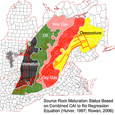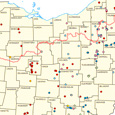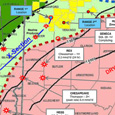If you don’t own shale lease, you have little say in changing landscape
Friday, July 27, 2012
UNIVERSITY PARK, Pa. — Ownership of the land in Pennsylvania counties with the most Marcellus Shale natural gas drilling activity is concentrated among relatively few residents and people living outside the counties.
According to a study by researchers in Penn State’s College of Agricultural Sciences, the majority of residents in these counties together own little of the total land area and, therefore, have relatively little “voice” in leasing decisions that affect whether and how Marcellus Shale drilling will occur in the counties.No voice
Together, half of the resident landowners in these counties control only about 1 percent of the land area, and renters have no “voice” at all, noted the lead investigator Timothy Kelsey, professor of agricultural economics.
Rather, Kelsey said, it is the top 10 percent of resident landowners, plus outside landowners (both public and private), who are able to make the major leasing decisions that affect communities. “In some counties, such as Sullivan, Tioga and Lycoming, nonresidents have more voice about what occurs than do county residents, because more than half of the land is owned by those outside the county,” Kelsey said. Counties included in the study are Bradford, Butler, Clearfield, Fayette, Greene, Lycoming, Sullivan, Tioga, Washington, Westmoreland and Wyoming. Dollars leaving counties. “Our analysis indicates that a majority of lease and royalty income from Marcellus Shale development will go to a relatively small share of the resident population in these counties, with much of the remainder going to others outside the counties,” the economist said.Change inevitable
Kelsey said the research is important because it documents that many of the residents in the counties with much drilling activity don’t have a voice in Marcellus development, despite having to deal with change in their communities.
“They are encountering rising rents and housing prices, housing shortages, significant increases in traffic and road congestion, changing demands for local government services, increased conflict, concerns about environmental consequences, student turnover in public schools, and changes in the landscape,” he said. “The decisions by nonresident owners and by the relatively small share of residents who own the majority of land thus can have profound implications for the quality of life for everyone else in the community.” The study, “Marcellus Shale: Land Ownership, Local Voice, and the Distribution of Lease and Royalty Dollars,” was done by Penn State’s Center For Economic and Community Development, which is housed in the College of the Agricultural Sciences. The research was entirely funded by the University.Does it matter?
“Much of the public debate about Marcellus Shale development revolves around differing views of fairness and equity,” he said. “These discussions often focus on the environmental, health, and other risks, the proper role for local government regulation and oversight of industry activities, and the ability of individual owners to use their resources as they believe is appropriate.”
The study was not intended to evaluate or make judgments about Pennsylvania’s law that allows counties to decide whether to allow Marcellus drilling and to impose an impact fee on wells, or the current distribution of control and income, Kelsey said. “Rather, we believe that understanding land-ownership patterns helps to clarify the economic implications of Marcellus Shale development and the context for the concerns some are expressing about the need for more local government control over that development.” he said. The publication is available at http://psu.ag/MvsePwonline.



